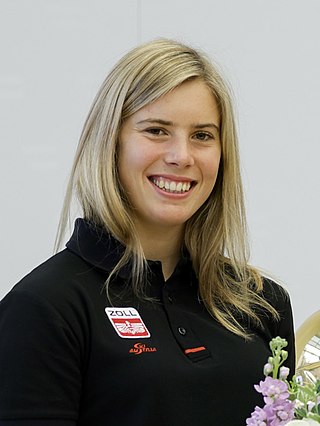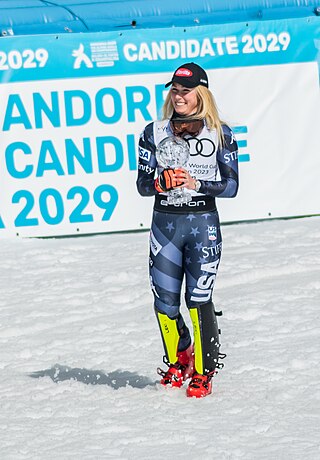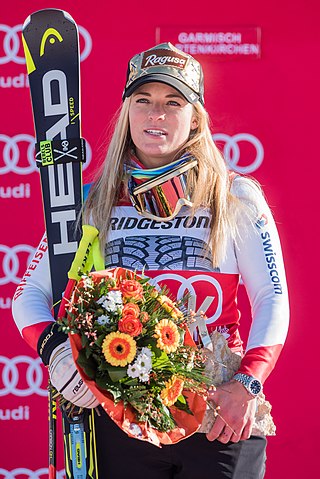
The International Ski Federation (FIS) Alpine Ski World Cup was the premier circuit for alpine skiing competition. The inaugural season launched in January 1967, and the 2018–19 season marks the 53rd consecutive year for the FIS World Cup.

The International Ski Federation (FIS) Alpine Ski World Cup, the premier circuit for alpine skiing competition, began in January 1967, and the 2019–20 season marked the 54th consecutive year for the FIS World Cup. As it had every year since 2006, the season began in Sölden, Austria in October. The season was supposed to end with the World Cup finals in March, which were to be held in Cortina d'Ampezzo, Italy for the first time since they began in 1993, but the finals were cancelled due to the COVID-19 outbreak in Italy.

The women's slalom in the 2021 FIS Alpine Skiing World Cup consisted of 9 events, as planned.

The women's giant slalom in the 2020 FIS Alpine Skiing World Cup involved 6 events. The season had been scheduled for nine events, but all of the last three giant slaloms were canceled.

The women's slalom in the 2020 Alpine Skiing World Cup involved 6 events, although there were 9 originally scheduled.

The International Ski Federation (FIS) Alpine Ski World Cup was the premier circuit for alpine skiing competition. The inaugural season launched in January 1967, and the 2021–22 season marked the 56th consecutive year for the FIS World Cup.

The women's slalom in the 2022 FIS Alpine Skiing World Cup consisted of 9 events, including the final.

The women's giant slalom World Cup 2021/2022 consisted of 9 events including the final. Overall World Cup leader Mikaela Shiffrin from the United States, who started out in the early lead in this discipline, contracted COVID-19 at the end of 2021 and missed the post-Christmas giant slalom, then Shiffrin lost the lead in this discipline to Sara Hector of Sweden in the first race in 2022.

The men's slalom in the 2019 FIS Alpine Skiing World Cup involved 12 events, including two parallel slaloms (both city events}. Marcel Hirscher of Austria won his sixth championship in the discipline, all in the prior seven years, on the way to his eighth straight overall men's championship. During the season, Hirscher had hinted at retiring after it, and before the start of the next season, he did announce his retirement.

The women's giant slalom in the 2023 FIS Alpine Skiing World Cup included ten events, including the final. The season was scheduled to open in Sölden, Austria on 22 October 2022, but the race was cancelled due to bad weather and rescheduled to Semmering, Austria on 27 December.

The women's slalom in the 2023 FIS Alpine Skiing World Cup consisted of eleven events, including the final. The original schedule also called for eleven events, but a night slalom at Zagreb on 5 January was cancelled due to high winds and warm weather and not immediately rescheduled. However, a week later, the race was rescheduled as a second slalom at Špindlerův Mlýn on 28 January, accompanied by a shift of the giant slalom scheduled there that day to Kronplatz on 25 January.

The women's super-G in the 2019 FIS Alpine Skiing World Cup involved 6 events, including the finals in Soldeu, Andorra. Originally, the season had been planned to hold 8 events, but the two races scheduled in Sochi, Russia were cancelled due to continuing heavy snowfall.

The women's giant slalom in the 2019 FIS Alpine Skiing World Cup involved 8 events.

The women's slalom in the 2018 FIS Alpine Skiing World Cup involved 12 events, including three parallel races and the season finale in Åre, Sweden.

The women's giant slalom in the 2017 FIS Alpine Skiing World Cup consisted of nine events, including the World Cup finals in Aspen, Colorado (USA). Tessa Worley of France had never won a season-long championship in the World Cup but this season had reached the giant slalom podium seven times, including three wins, and held an 80-point lead over runner-up Mikaela Shiffrin of the US in the standings before the finals. In the finals, Worley finished fifth and became a first-time discipline champion.

The women's slalom in the 2017 FIS Alpine Skiing World Cup involved 10 events, including one parallel slalom and the season finale in Aspen, Colorado (USA).

The Women's Combined in the 2017 FIS Alpine Skiing World Cup involved three events, first a super-combined, and then two Alpine combined. Downhill champion Ilka Štuhec of Slovenia won the super-combined and held on to win the season championship. Interestingly, in only her second race in the combined discipline ever, overall World Cup champion Mikaela Shiffrin won the final race.

The women's slalom competition in the 2016 FIS Alpine Skiing World Cup involved 11 events, including one parallel slalom and the season finale in St. Moritz, Switzerland.

The women's giant slalom in the 2024 FIS Alpine Skiing World Cup is scheduled to include eleven events, including the final. The season opened in Sölden, Austria on 28 October 2023.

The women's slalom in the 2024 FIS Alpine Skiing World Cup is scheduled to consist of eleven events, including the final. The slalom season began with the traditional "reindeer" opening races in Levi, Finland on 11-12 November 2023.














